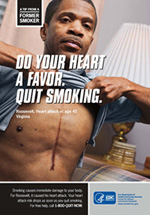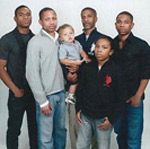Make This a Smoke-Free Father's Day
 Fathers play a significant role influencing their children. Dads are encouraged to model a healthy way of living for their children by not smoking. Together, family and friends can support Dads trying to quit.
Fathers play a significant role influencing their children. Dads are encouraged to model a healthy way of living for their children by not smoking. Together, family and friends can support Dads trying to quit.
Make This a Smoke-Free Father’s Day
Father's Day is an occasion to mark and celebrate the contribution that fathers and father figures make to children's lives. Fathers help their children develop morals and values as well as a belief system. They also help them navigate their way through society and influence general habits and their overall way of living. An increasing amount of research on the roles that fathers play in families points to the significant and unique ways they influence and affect the lives of their children. Roles such as “provider” and “hero” can change based on the decisions that a father makes in his own life. These decisions can have a profound effect—changing the path a child takes in life as well as their perception of their father because they view him as a role model. This Father’s Day, if you smoke, CDC encourages you to model a healthy way of living for your children by quitting. And congratulations are in order for the fathers who have already resolved to quit smoking!
Keep Dads Healthy for Their Family
 Tobacco use remains the leading cause of preventable death in the United State. In 2010, nearly one in five U.S. adults (45.3 million) were current smokers. Cigarette smoking accounts for an estimated 443,000 deaths each year in the United States, or nearly one of every five deaths. And for every smoking-related death, another 20 people suffer with a smoking-related disease. Smoking harms nearly every organ of the body and causes many diseases such as coronary heart disease, stroke, and lung cancer, to name a few. More men (nearly 22%) than women (about 17%) smoke. Smoking causes an estimated 90% of all lung cancer deaths in men. Men who smoke increase their risk of dying from bronchitis by nearly 10 times; from emphysema, by nearly 10 times; and from lung cancer, by more than 22 times. And smoking triples middle-aged men's risk of dying from heart disease.
Tobacco use remains the leading cause of preventable death in the United State. In 2010, nearly one in five U.S. adults (45.3 million) were current smokers. Cigarette smoking accounts for an estimated 443,000 deaths each year in the United States, or nearly one of every five deaths. And for every smoking-related death, another 20 people suffer with a smoking-related disease. Smoking harms nearly every organ of the body and causes many diseases such as coronary heart disease, stroke, and lung cancer, to name a few. More men (nearly 22%) than women (about 17%) smoke. Smoking causes an estimated 90% of all lung cancer deaths in men. Men who smoke increase their risk of dying from bronchitis by nearly 10 times; from emphysema, by nearly 10 times; and from lung cancer, by more than 22 times. And smoking triples middle-aged men's risk of dying from heart disease.
New CDC Campaign Highlights the Real-Life Health Consequences of Smoking
CDC recently launched a national tobacco education campaign called Tips From Former Smokers. This campaign features a variety of real people, many of whom started smoking in their teens and are suffering from smoking-related illnesses. By showing people whose lives have been affected by the damage caused by smoking, CDC hopes to encourage smokers to quit and young people not to start and to strongly discourage smoking around children.
Hear Roosevelt’s Story and How His Smoking Changed His Life and the Lives of His Children
 Roosevelt, a 51-year-old father of five, is featured in the Tips campaign. Roosevelt started experimenting with cigarettes in his teens. Nearly 30 years after starting to smoke, the damage began taking its toll. At 45, Roosevelt experienced a heart attack that landed him in the hospital for a month. He had a total of six bypasses in an attempt to repair his heart. “A heart attack feels like a hand inside squeezing your heart,” he says. “It's like the worst charley horse you can imagine—in your heart!” Roosevelt found cigarettes to be so addictive that even after his surgery he continued to smoke. Now 51, Roosevelt has been smoke-free for 3 years, but he's had to give up his career as a commercial plumber because his heart no longer is strong enough for the strenuous activity such work requires. Roosevelt also can no longer do things with his children that he used to do. That has caused a shift in his identity, in the way he perceives his role in the family, and in the way his children see him. He says the love, support—and constant nagging—of his family was the key to him being able to quit smoking. “If you have loved ones who care about you, they will support you. Take it one day at a time,” Roosevelt says. “But if you smoke and want to see your kids graduate and want to see your grandkids someday, stop smoking.”
Roosevelt, a 51-year-old father of five, is featured in the Tips campaign. Roosevelt started experimenting with cigarettes in his teens. Nearly 30 years after starting to smoke, the damage began taking its toll. At 45, Roosevelt experienced a heart attack that landed him in the hospital for a month. He had a total of six bypasses in an attempt to repair his heart. “A heart attack feels like a hand inside squeezing your heart,” he says. “It's like the worst charley horse you can imagine—in your heart!” Roosevelt found cigarettes to be so addictive that even after his surgery he continued to smoke. Now 51, Roosevelt has been smoke-free for 3 years, but he's had to give up his career as a commercial plumber because his heart no longer is strong enough for the strenuous activity such work requires. Roosevelt also can no longer do things with his children that he used to do. That has caused a shift in his identity, in the way he perceives his role in the family, and in the way his children see him. He says the love, support—and constant nagging—of his family was the key to him being able to quit smoking. “If you have loved ones who care about you, they will support you. Take it one day at a time,” Roosevelt says. “But if you smoke and want to see your kids graduate and want to see your grandkids someday, stop smoking.”
Meet James, a Former Smoker Who Wanted to Be Like His “Hero”
 Also featured in the Tips From Former Smokers campaign is James. James started smoking at age 14 in an attempt to be like his father. James' father was his hero—a very strong and well-respected man. James wanted to be like him. He started snatching cigarettes from his dad, and that’s how he got addicted. Thirty years later, he decided to quit and adopt a much healthier lifestyle. Now 48, James has been smoke-free for 2 years and has made other important changes to improve his health. He became an avid cyclist and rides up to 10 miles each day for exercise. He also enjoys swimming and does some sort of cardio exercise every morning. James wanted to participate in the Tips From Former Smokers campaign to send a message to people who think smoking isn't going to hurt them just because they haven't experienced a smoking-related health problem yet. He says that if you smoke, you should quit. “I want to help people like me quit smoking—people in their forties. Maybe nothing really bad has happened to them yet,” says James. “Maybe you're lucky, but you're probably not going to stay lucky.”
Also featured in the Tips From Former Smokers campaign is James. James started smoking at age 14 in an attempt to be like his father. James' father was his hero—a very strong and well-respected man. James wanted to be like him. He started snatching cigarettes from his dad, and that’s how he got addicted. Thirty years later, he decided to quit and adopt a much healthier lifestyle. Now 48, James has been smoke-free for 2 years and has made other important changes to improve his health. He became an avid cyclist and rides up to 10 miles each day for exercise. He also enjoys swimming and does some sort of cardio exercise every morning. James wanted to participate in the Tips From Former Smokers campaign to send a message to people who think smoking isn't going to hurt them just because they haven't experienced a smoking-related health problem yet. He says that if you smoke, you should quit. “I want to help people like me quit smoking—people in their forties. Maybe nothing really bad has happened to them yet,” says James. “Maybe you're lucky, but you're probably not going to stay lucky.”
Fathers: Be Smoke-Free Role Models
- Do not start smoking.
- Don’t allow others to smoke in your home, vehicles, or around your children.
- Teach your children about the health risks of smoking and secondhand smoke.
- If you are a dad who smokes, quit now. It is the best thing you can do for your family. Children of parents who smoke are twice as likely to become smokers.
Support to Quit
For free quit support, call 1-800-QUIT-NOW (1-800-784-8669; TTY 1-800-332-8615). This service provides free support and advice from experienced counselors, a personalized quit plan, self-help materials, the latest information about cessation medications, and more.
Cessation services and resources are also available online in English, and in Spanish. These Web sites provide free, accurate, evidence-based information and professional assistance to help support the immediate and long-term needs of people trying to quit smoking.
More Information
For more information on the health consequences of smoking and exposure to tobacco smoke, as well as resources on how to quit, consult the following:
- Tips From Former Smokers campaign Web site www.cdc.gov/quitting/tips
- Learn more about Roosevelt: http://www.cdc.gov/tobacco/campaign/tips/stories/roosevelt.html
- Learn more about James: http://www.cdc.gov/tobacco/campaign/tips/stories/james.html
- How Tobacco Smoke Causes Disease: What It Means to You
- Help for Smokers and Other Tobacco Users: Quit Smoking
- How to Quit Resources
- Vital Signs: Tobacco Use
CDC works 24/7 saving lives and protecting people from health threats to have a more secure nation. A US federal agency, CDC helps make the healthy choice the easy choice by putting science and prevention into action. CDC works to help people live longer, healthier and more productive lives.
Get email updates
To receive email updates about this page, enter your email address:
Contact Us:
- Centers for Disease Control and Prevention
1600 Clifton Rd
Atlanta, GA 30333 - 800-CDC-INFO
(800-232-4636)
TTY: (888) 232-6348 - cdcinfo@cdc.gov



